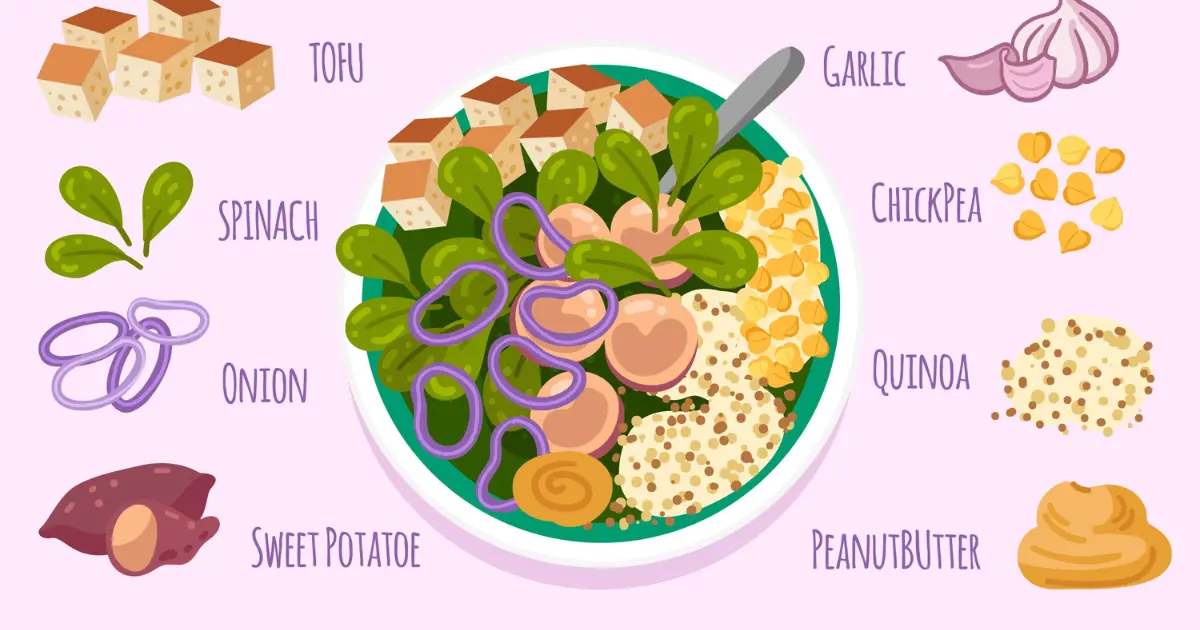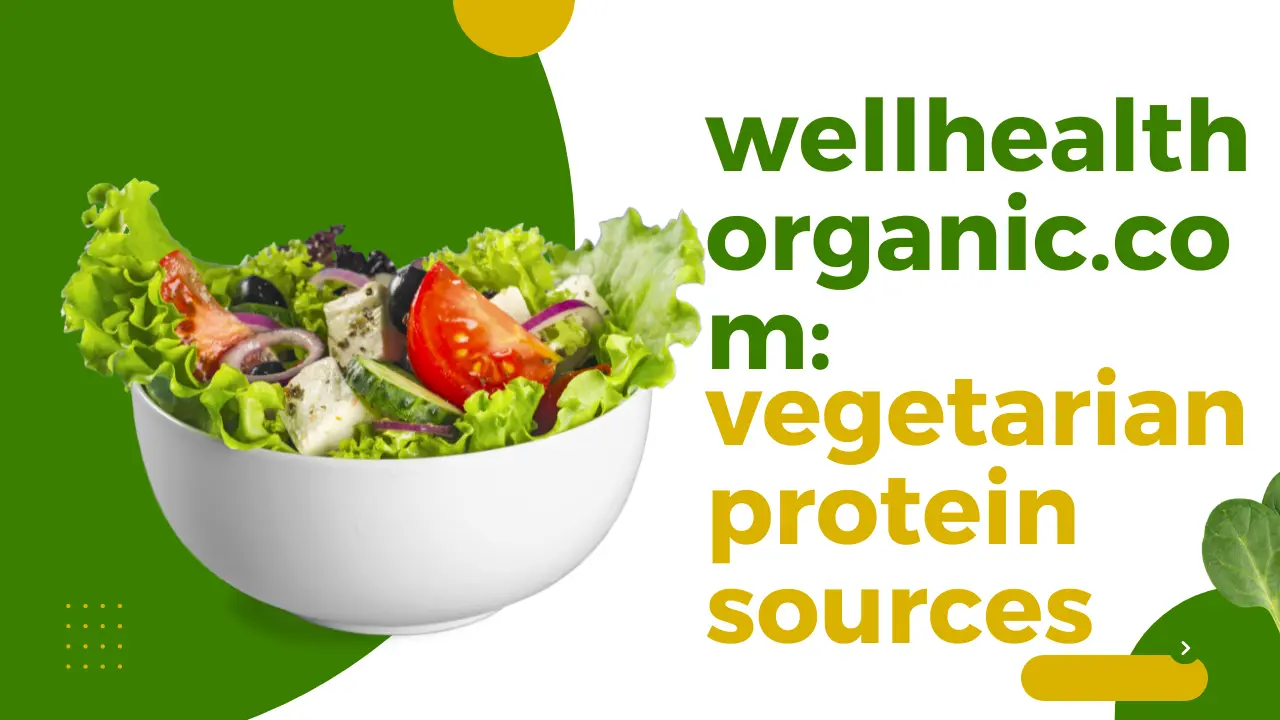In the ever-evolving landscape of dietary choices, vegetarianism is gaining traction for its health benefits, ethical considerations, and environmental impact. A pivotal aspect of this lifestyle is ensuring adequate protein intake. Contrary to common misconceptions, a vegetarian diet can provide all the necessary nutrients, including high-quality protein. This article delves into the myriad of wellhealthorganic.com:vegetarian protein sources, offering a comprehensive guide for those seeking to maintain a balanced and nutritious diet without consuming meat.
The Importance of Protein in a Vegetarian Diet

Why Protein is Essential
Protein plays a crucial role in the body, aiding in muscle repair, hormone production, and immune function. For vegetarians, finding sufficient wellhealthorganic.com:vegetarian protein sources is vital to maintain overall health and well-being.
Daily Protein Requirements
The recommended daily intake of protein varies based on age, gender, and activity level. On average, adults require about 46-56 grams per day. Vegetarians must plan their meals to meet these needs without relying on animal products.
Plant-Based Protein Sources
Lentils, Chickpeas, Black Beans, Quinoa, Green Peas.
| Plant-Based Protein Source | Protein Content (per serving) | Other Nutritional Benefits | Common Uses |
| Lentils | 18g per cup (cooked) | High in fiber, iron, and folate | Soups, stews, salads, and curries |
| Chickpeas (Garbanzo beans) | 15g per cup (cooked) | High in fiber, iron, and manganese | Hummus, salads, soups, and curries |
| Black Beans | 15g per cup (cooked) | High in fiber, iron, and folate | Burritos, salads, soups, and stews |
| Quinoa | 8g per cup (cooked) | Contains all nine essential amino acids | Salads, bowls, and as a rice substitute |
| Nutritional Yeast | 8g per 1/4 cup | High in B-vitamins and fiber | Sauces, soups, and as a seasoning |
| Green Peas | 8g per cup (cooked) | High in fiber, vitamins A, C, and K | Soups, salads, and side dishes |
| Peanut Butter | 8g per 2 tbsp | High in healthy fats and vitamin E | Spreads, smoothies, and baking |
| Seitan (Wheat Gluten) | 21g per 3 oz | Low in fat, high in iron | Stir-fries, sandwiches, and grilled dishes |
Nuts and Seeds
Almonds
Almonds provide 6 grams of protein per ounce and are also high in healthy fats, fiber, and vitamin E.
Chia Seeds
Chia seeds offer 4 grams of protein per ounce and are an excellent source of omega-3 fatty acids, fiber, and antioxidants.
Hemp Seeds
Hemp seeds contain 10 grams of protein per ounce and provide a complete protein source, meaning they contain all nine essential amino acids.
Soy Products
Tofu
Tofu, made from soybeans, offers about 10 grams of protein per half-cup. It is versatile and can be used in a variety of dishes.
Tempeh
Tempeh provides around 15 grams of protein per half-cup and has a firm texture, making it a great meat substitute in many recipes.
Edamame
Edamame, or young soybeans, offer 17 grams of protein per cooked cup. They are often enjoyed as a snack or added to salads and stir-fries.
Grains
Quinoa
Quinoa is a complete protein, providing 8 grams of protein per cooked cup. It is also high in fiber and other essential nutrients.
Buckwheat
Buckwheat offers 6 grams of protein per cooked cup and is gluten-free, making it a great option for those with gluten sensitivities.
Amaranth
Amaranth provides 9 grams of protein per cooked cup and is rich in iron, magnesium, and other vital nutrients.
Dairy and Egg Alternatives
Greek Yogurt
Greek yogurt is a high-protein dairy option, offering around 10 grams of protein per 100 grams. It is also rich in probiotics, which support gut health.
Cottage Cheese
Cottage cheese contains about 11 grams of protein per 100 grams and is a versatile ingredient for both sweet and savory dishes.
Eggs
For lacto-ovo vegetarians, eggs are an excellent protein source, with 6 grams of protein per egg. They are also rich in essential vitamins and minerals.
Protein-Rich Vegetables
Spinach
Spinach provides 5 grams of protein per cooked cup and is also high in iron and calcium.
Broccoli
Broccoli offers 4 grams of protein per cooked cup and is rich in vitamins K and C.
Brussels Sprouts
Brussels sprouts contain 4 grams of protein per cooked cup and are also high in fiber and antioxidants.
Protein Supplements
Plant-Based Protein Powders
Protein powders made from peas, hemp, rice, and other plants can be an effective way to boost protein intake, especially for athletes or those with higher protein needs.
Protein Bars
Proteins bars are convenient on-the-go snacks that can help meet daily protein requirements. Look for bars with minimal added sugars and artificial ingredients.
Combining wellhealthorganic.com:vegetarian protein sources
Complementary Proteins
Certain plant-based foods can be combined to form complete proteins, ensuring all essential amino acids are consumed. Examples include rice and beans, hummus, and whole-grain pita.
Meal Planning Tips
Planning meals to include a variety of protein sources throughout the day can help ensure adequate intake. Incorporate different legumes, nuts, seeds, and whole grains into your diet.
Health Benefits of wellhealthorganic.com:vegetarian protein sources
Heart Health
Plant-based diets are associated with lower risks of heart disease, thanks to their lower saturated fat content and higher fiber intake.
Weight Management
High-protein vegetarian foods can help with weight management by promoting satiety and reducing overall calorie intake.
Digestive Health
Many plant-based proteins are also high in fiber, which supports healthy digestion and regular bowel movements.
Potential Challenges and Solutions
Common Myths
Addressing myths such as “vegetarians can’t get enough protein” and providing evidence-based responses.
Overcoming Nutrient Deficiencies
Tips on ensuring adequate intake of other nutrients often lacking in vegetarian diets, such as vitamin B12, iron, and omega-3 fatty acids.
Personal Stories and Case Studies
Real-Life Examples
Sharing stories of individuals who have successfully maintained a vegetarian diet while meeting their protein needs and achieving their health goals.
Expert Insights
Nutritionist Quotes
Incorporating advice from nutritionists on the best practices for ensuring adequate protein intake on a vegetarian diet.
Conclusion
Incorporating a variety of wellhealthorganic.com:vegetarian protein sources into your diet is essential for maintaining overall health and well-being. From legumes and nuts to dairy alternatives and protein-rich vegetables, there are numerous options to meet your protein needs without relying on animal products. By planning your meals thoughtfully and combining complementary proteins, you can ensure a balanced and nutritious diet. Embracing these plant-based protein sources can also contribute to better heart health, effective weight management, and improved digestive health. Additionally, exploring Wellhealthorganic.com : morning coffee tips with no side effect can further enhance your daily routine by incorporating healthy habits. Start exploring and experimenting with these protein-rich foods to enhance your vegetarian diet and enjoy their numerous health benefits.



